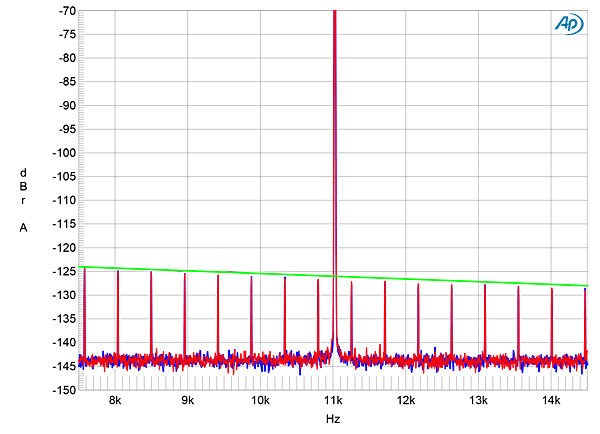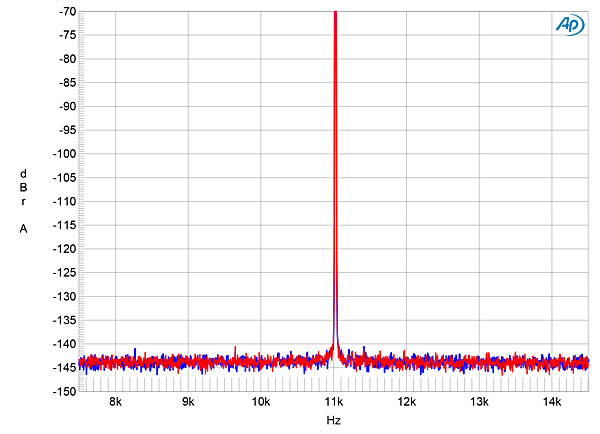We might be differing in just a matter of degree but I consider close-in phase noise causes a broadening of the pure frequencies, rather than vibrato. Vibrato, to me would be where a pure frequency is alternating with another pure frequency at a certain beat frequency. Why I don't think close-in phase noise (LF jitter) fits this description is because the jitter (phase noise) is randomly distributed either side of the fundamental, causing it to spectrally broaden the fundamental. On the usual jitter plot you will see close-in phase noise as a broadening of the fundamental - wider at the base & narrowing closer to the fundamental. I suspect that tremelo would show two definite spurs at different frequencies but at similar amplitudes?We're on the same page...jitter is vibrato....anybody with a synth will tell you that modulating/filtering/dynamics of the vibrato control voltage will cause all manner of audible effects/voicings etc.
Of course digital system jitter/vibrato magnitude is much lower level than the synth example but it has the same effects none the less.
Jitter/vibrato also causes tremolo, just to add a little confusion into the mix. 😱.
What is the Difference Between Vibrato and Tremolo?
This plot shows close-in jitter broadening the fundamental as well as spurs at definitive frequencies away from the fundamental (could result in tremolo)

I've actually only ever experienced low jitter. low & stable noise as resulting in more engagement with the sound, never in boring sound - to me boring sound is the result of some of the issues already spoken of in the reproduction system - I believe that PS, oscillator close-in phase noise & leakage currents, ground loops, etc ultimately end up in noise modulation which is the cause of boring soundSure that's the first thing to attend to, but after that the remaining clock uncertainties can be set to an order or orders that are subjectively satisfying or subjectively innocuous or subjectively absent.
Similar in a sense to your experience of Jocko's selected crystals, I can at will dial up any of the above three subjective findings.....dead clean can end up sounding boring long term, a bit of the right 'reclocking' (controlled/known added clock noise) can do wonders for long term enjoyment and satisfaction (and more).
Would like to hear your thoughts on thisHow and why this can be digs deeper into physics, physiology and neural processing/perception.
Dan.
This plot shows close-in jitter broadening the fundamental as well as spurs at definitive frequencies away from the fundamental (could result in tremolo)

A typical "Popular Audiophile" graph. No scales on both axis, no values. Thus worse than nothing.
Modern DACs have close to zero jitter.


Mytek Liberty D/A processor Measurements | Stereophile.com
(Autism) It's such a large spectrum, including Aspergers, as to be almost meaningless
Scott, don't get me wrong, but are you expressing an informed opinion, making a qualified statement, or conveying a substantiated fact?
You see, I belong to a creative diaspora that sees autism as a gift of incalculable value. Particularly in the relationships between sound and vision.
Just wanted to make sure, that's all.
ToS
The plot was posted to show the point I was making - the difference between close-in phase noise (which is random) & jitter spurs (which normally result from non-random, deterministic events)A typical "Popular Audiophile" graph. No scales on both axis, no values. Thus worse than nothing.
Your criticism misses the point
And here's where you show your lack of understanding of what's being spoken about - close-in phase noise. You show plots which you don't understand otherwise you wouldn't make the claim.
What do you think close-in phase noise means? Define a frequency range offset from the fundamental that qualifies jitter falls in this category? Now tell us how it would show on your posted plots with that wide a frequency range as seen on the x-axis?
I suspect you will try to counter your false claim with a demand for me to produce close-in phase noise plots for devices
Last edited:
I think it's meaningless to discuss intelligence in autism because it varies so much, as does autism itselfScott, don't get me wrong, but are you expressing an informed opinion, making a qualified statement, or conveying a substantiated fact?
You see, I belong to a creative diaspora that sees autism as a gift of incalculable value. Particularly in the relationships between sound and vision.
Just wanted to make sure, that's all.
ToS
I think it's meaningless to discuss intelligence in autism because it varies so much, as does autism itself
Fair comment, and thank you for your clarification.
If one has the intelligence to recognise and understand autism, then perhaps autism is a natural part of what defines human intelligence.
ToS
I'm afraid I don't have the (kind of 😉) intelligence to understand that....or perhaps I do?...🙂If one has the intelligence to recognise and understand autism, then perhaps autism is a natural part of what defines human intelligence.
Every time I ask you about what you sell or not, you go silent. That means you do but don't want to acknowledge it publicly.Maybe I've made a mistake. Just to be sure, you don't sell any audio electronics and related accessories?You're so sure of yourself that you see no possibility that you could be wrong, do you? And with the feverish surety of a zealot you castigate any & all that I say.
I'm afraid I don't have the (kind of 😉) intelligence to understand that....or perhaps I do?...🙂
Ohhhh, I think you do Scott. 😉
It's part of what makes each and everyone of us uniquely human. Caveat being that we are only beginning to understand what autism is. I see it as an asset that is remarkably complex to define. I can also see why others may wish to differ in their observations.
Nevertheless, after a lifetime of living amongst artists, I do recognise certain subtle signifiers of autism, and when to recognise how a genuine artist differs from a career trained wannabe. The real deal doesn't have much of a choice in the matter.
ToS
Might have missed someone else saying this and a few pages late but what the hey. Digital vs analog tv. Your comparisons are unfair. 25 years ago radius had a 22" vga ( analog ) crt computer monitor that was 2000 lines resolution. It looked fantastic. Probably as good as a lot of modern digital tv's. Its not analog vs digital but the implementation that counts. Same with audio. There are advantages to digital: storage, transmission, compression, dsp, noise, timing ( wow and flutter ) cataloging and instant access. And to analoge, mostly no A/D D/A conversions.
Every time I ask you about what you sell or not, you go silent. That means you do but don't want to acknowledge it publicly.
Not hard to tell by his posts.
Element 118 Power amplifier Monoblocks
Over priced, along with the usuall audiphool marketing bs:
"The first and foremost consideration for true to life music reproduction is speed."
No wonder he dosnt want us to know.
Got to wonder why hes on a do it your self site.
Last edited:
Not hard to tell by his posts.
Element 118 Power amplifier Monoblocks
Over priced, along with the usuall audiphool marketing bs:
"The first and foremost consideration for true to life music reproduction is speed."
No wonder he dosnt want us to know.
Got to wonder why hes on a do it your self site.
Can you two find some torch carrying mob that will accept you & go there?
You're not wanted here
Perception of any sensory stimulus is strictly a private experience which cannot be directly communicated. Unless a method is discovered that permits connecting two minds to fuse into one temporarily, discussing perceptions remains a useless waste of time and effort.
The old Latin adage tends to also apply here: "De gustibus non est disputandum".
The old Latin adage tends to also apply here: "De gustibus non est disputandum".
Perception of any sensory stimulus is strictly a private experience which cannot be directly communicated. Unless a method is discovered that permits connecting two minds to fuse into one temporarily, discussing perceptions remains a useless waste of time and effort.
The old Latin adage tends to also apply here: "De gustibus non est disputandum".
The phrase "auditory perception" is not about taste or preference - it's about the mechanisms underlying the sense called hearing which we all share. It's a well known area of research.
Perhaps it's a DIY business. Does it really matter though? It's what people post that matters, or not.Got to wonder why hes on a do it your self site.
Might have missed someone else saying this and a few pages late but what the hey. Digital vs analog tv. Your comparisons are unfair. 25 years ago radius had a 22" vga ( analog ) crt computer monitor that was 2000 lines resolution. It looked fantastic. Probably as good as a lot of modern digital tv's. Its not analog vs digital but the implementation that counts.
Ah, I think you may have misconstrued the comparison I was making between analog and digital domestic consumer level broadcast television, in that they are as bad as each other. 🙂
Other, than that, I agree with what you say. For many years I too worked with high resolution calibrated analog flat screen CRT monitors for doing high-end Photoshop work. They were wonderful for retouching and colour correcting scanned film, and for CMYK repro proofing work they were incomparable with even the very best of the current crop of digital monitors. A lot of folks in the repro industry agree with this.

So yes, the implementation of both analog and digital really counts. I like both equally for what I think are entirely the right reasons as I'm sure you do too.

ToS
Perhaps it's a DIY business. Does it really matter though? It's what people post that matters, or not.
It matters if there posts are skewed by $$$. How do you justify $36k for one channel of power? And thats what im seeing.
Agreed. Wasn't replying to you but the first post.
Ah, my error entirely. It's been a long day. ToS
Can you two find some torch carrying mob that will accept you & go there?
You're not wanted here
The truth hurts.
- Status
- Not open for further replies.
- Home
- Member Areas
- The Lounge
- Auditory Perception in relation to this hobby